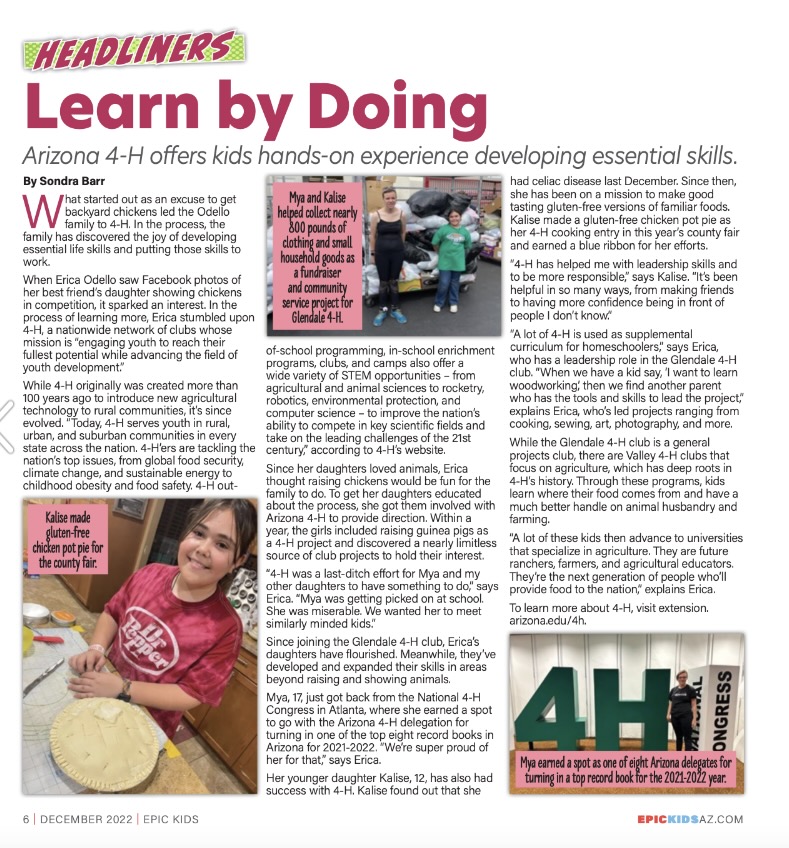By Sondra Barr
What started out as an excuse to get backyard chickens led the Odello family to 4-H. In the process, the family has discovered the joy of developing essential life skills and putting those skills to work.
When Erica Odello saw Facebook photos of her best friend’s daughter showing chickens in competition, it sparked an interest. In the process of learning more, Erica stumbled upon 4-H, a nationwide network of organizations whose mission is “engaging youth to reach their fullest potential while advancing the field of youth development.”
While 4-H originally was created more than 100 years ago to introduce new agricultural technology to rural communities, it’s since evolved. “Today, 4‑H serves youth in rural, urban, and suburban communities in every state across the nation. 4‑H’ers are tackling the nation’s top issues, from global food security, climate change, and sustainable energy to childhood obesity and food safety. 4‑H out-of-school programming, in-school enrichment programs, clubs and camps also offer a wide variety of STEM opportunities – from agricultural and animal sciences to rocketry, robotics, environmental protection, and computer science – to improve the nation’s ability to compete in key scientific fields and take on the leading challenges of the 21st century,” according to 4-H’s website.
Since her daughters loved animals, Erica thought raising chickens would be fun for the family to do. To get her daughters educated about the process, she got them involved with Arizona 4-H to provide direction. Within a year, the girls included raising guinea pigs as a 4-H project and discovered a nearly limitless source of club projects to hold their interest.
“4-H was a last-ditch effort for Mya and my other daughters to have something to do,” says Erica. “Mya was getting picked on at school. She was miserable. We wanted her to meet similarly minded kids.”
Since joining the Glendale 4-H club, Erica’s daughters have flourished. Meanwhile, they’ve developed and expanded their skills in areas beyond raising and showing animals.
Mya, 17, just got back from the National 4-H Congress in Atlanta, where she earned a spot to go with the Arizona 4-H delegation for turning in one of the top eight record books in Arizona for 2021-2022. “We’re super proud of her for that,” says Erica.
Her younger daughter Kalise, 12, has also had success with 4-H. Kalise found out that she had celiac disease last December. Since then, she has been on a mission to make good tasting gluten free versions of familiar foods. Kalise made a gluten free chicken pot pie as her 4-H cooking entry for this year’s state fair and earned a blue ribbon for her efforts.
“4-H has helped me with leadership skills and to be more responsible,” says Kalise. “It’s been helpful in so many ways, from making friends to having more confidence being in front of people I don’t know.”
“A lot of 4-H is used as supplemental curriculum for homeschoolers,” says Erica, who has a leadership role in the Glendale 4-H club. “When we have a kid say, ‘I want to learn woodworking,’ then we find another parent who has the tools and skills to lead the project,” explains Erica, who’s led projects ranging from cooking, sewing, art, photography, and more.
While the Glendale 4-H club is a general projects club, there are Valley 4-H clubs that focus on agricultural, which has deep roots in 4-H’s history. Through these programs, kids learn where their food comes from and have a much better handle on animal husbandry and farming.
“A lot of these kids then advance to universities that specialize in agriculture. They are future ranchers, farmers, and agricultural educators. They’re the next generation of people who’ll provide food to the nation,” explains Erica.
To learn more about 4-H, visit extension.arizona.edu/4h.






